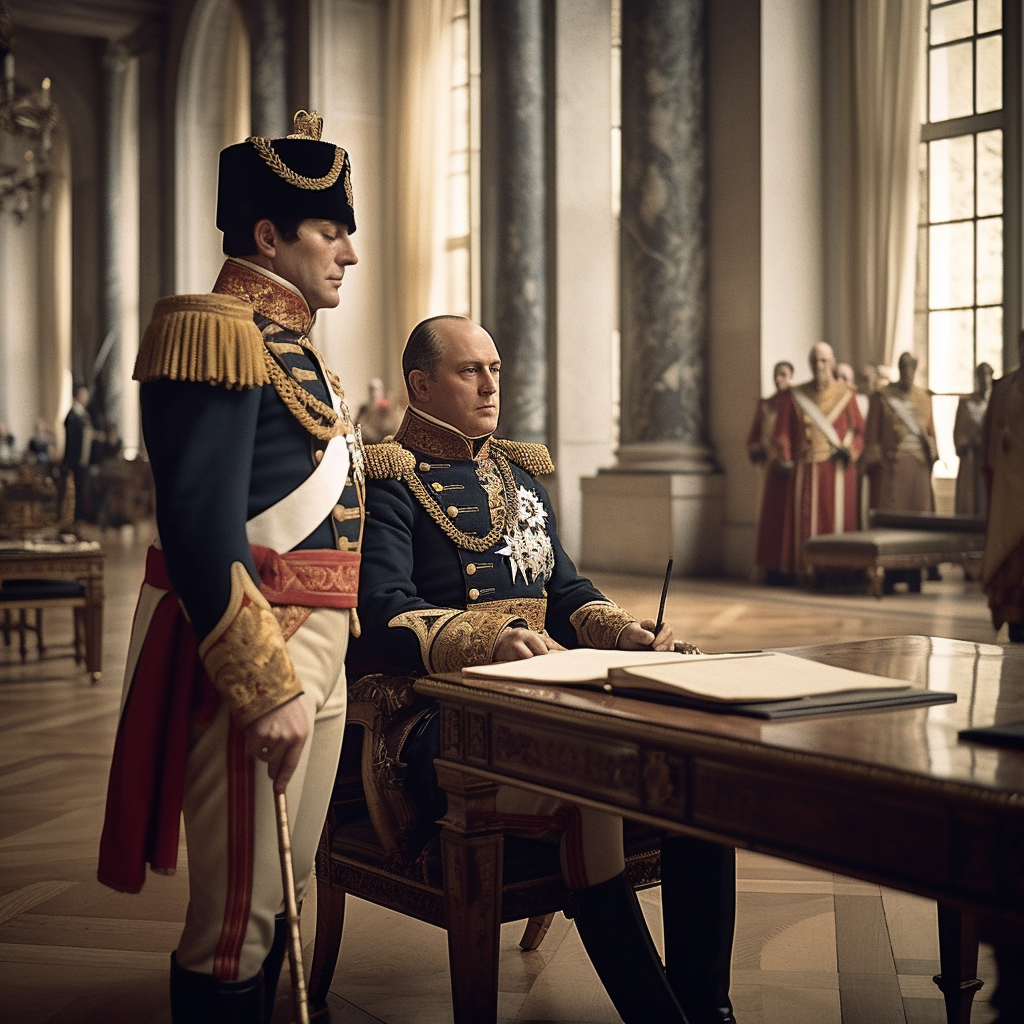HOME | DD
 ImperialChronicles — Signature of the abdication of the King of England
ImperialChronicles — Signature of the abdication of the King of England

#alternate #alternatehistory #alternatetimeline #creativewriting #empire #fiction #historicalfiction #napoleon #napoleonic #worldbuilding #alteredpast #uchronie #empirefrancais #whatifhistory #futuralternatif #midjourney #trafalgaralternate #imperialchronicles #timedivergence #frenchempireart #imaginaryhistory #3eempirefrançais #thirdfrenchempir #alternativefutur #unitedkingdom #coronation2023 #coronationday2023
Published: 2023-05-06 16:35:10 +0000 UTC; Views: 2720; Favourites: 16; Downloads: 2
Redirect to original
Description
French :*5 Novembre 1806 : *
**Signature de l'abdication du roi d'Angleterre George III face à l'Empire français. **
Le roi, assis, le visage empreint de gravité et de résignation, signant le document d'abdication.
À ses côtés, Napoléon Bonaparte se tient debout, imposant et impérial.
La signature de l'acte d'abdication fut un événement méticuleusement organisé, respectant les protocoles en vigueur pour de telles occasions. Les représentants des deux nations, ainsi que les membres de la noblesse et de l'aristocratie, assistèrent à la cérémonie solennelle, conscients de l'importance historique de cet événement qui allait redessiner la carte politique de l'Europe.
Au cours de la cérémonie, le roi George III revêtit l'uniforme de l'Empire français, un geste symbolique visant à apaiser les tensions et à montrer qu'il était prêt à mettre de côté les hostilités passées pour travailler en étroite collaboration avec Napoléon. Ce choix vestimentaire contribuait également à unir les peuples français et britannique, qui pourraient désormais travailler ensemble pour construire un avenir commun sous la bannière de l'Empire.
Cependant, des rumeurs circulaient à l'époque, laissant entendre que le port de l'uniforme impérial n'était peut-être pas un choix volontaire du roi, mais plutôt une exigence de Napoléon pour affirmer son pouvoir sur la Grande-Bretagne. Soucieux de ménager la dignité du roi George III et d'éviter de l'humilier devant son peuple, Napoléon aurait concédé au souverain britannique la possibilité de fournir sa propre explication de concorde, lui offrant ainsi une porte de sortie plus honorable.
La décision du roi George III de signer l'acte d'abdication de sa main gauche, alors qu'il était droitier, témoignait de sa désapprobation silencieuse et symbolique face à la situation. Ce geste inhabituel et maladroit envoyait un message subtil à son peuple et à l'histoire, exprimant son désaccord et sa désillusion face à la perte de souveraineté de la Grande-Bretagne et à l'assujettissement de la nation sous la domination de l'Empire français.
Dans le contexte tumultueux de l'époque, cette abdication suscita des réactions diverses et contrastées au sein de la population britannique. Les anti-royalistes, inspirés par la Révolution française et aspirant à la création d'une république, accueillirent favorablement cette nouvelle ère de domination française, y voyant une opportunité de réforme et de modernisation de la société britannique.
Dans ce contexte complexe, l'abdication du roi George III marquait le début d'une nouvelle ère pour la Grande-Bretagne et l'Europe, une ère de changements politiques, sociaux et culturels, où les aspirations révolutionnaires et impériales allaient cohabiter et façonner un nouvel ordre mondial.
English :
November 5, 1806: Signature of the abdication of the King of England George III in the face of the French Empire.
The king sat with a grave and resigned expression as he signed the document of abdication. Standing beside him was Napoleon Bonaparte, imposing and imperial.
The signing of the abdication was a meticulously organized event, respecting the protocols in force for such occasions. Representatives from both nations, as well as members of the nobility and aristocracy, attended the solemn ceremony, aware of the historical significance of this event that would redraw the political map of Europe.
During the ceremony, King George III donned the uniform of the French Empire, a symbolic gesture aimed at calming tensions and showing that he was ready to put aside past hostilities to work closely with Napoleon. This choice of clothing also contributed to uniting the French and British peoples, who could now work together to build a common future under the banner of the Empire.
However, rumors circulated at the time suggesting that the wearing of the imperial uniform may not have been a voluntary choice of the king, but rather a requirement of Napoleon to assert his power over Great Britain. Concerned with preserving the dignity of King George III and avoiding humiliating him in front of his people, Napoleon may have conceded to the British sovereign the possibility of providing his own explanation of concord, thus offering him a more honorable way out.
King George III's decision to sign the act of abdication with his left hand, even though he was right-handed, was a silent and symbolic disapproval of the situation. This unusual and awkward gesture sent a subtle message to his people and history, expressing his disagreement and disillusionment with the loss of sovereignty of Great Britain and its subjection to the domination of the French Empire.
In the tumultuous context of the time, this abdication elicited diverse and contrasting reactions among the British population. Anti-royalists, inspired by the French Revolution and aspiring to the creation of a republic, welcomed this new era of French domination, seeing it as an opportunity for reform and modernization of British society.
In this complex context, the abdication of King George III marked the beginning of a new era for Great Britain and Europe, an era of political, social and cultural changes, where revolutionary and imperial aspirations would coexist and shape a new world order.


























